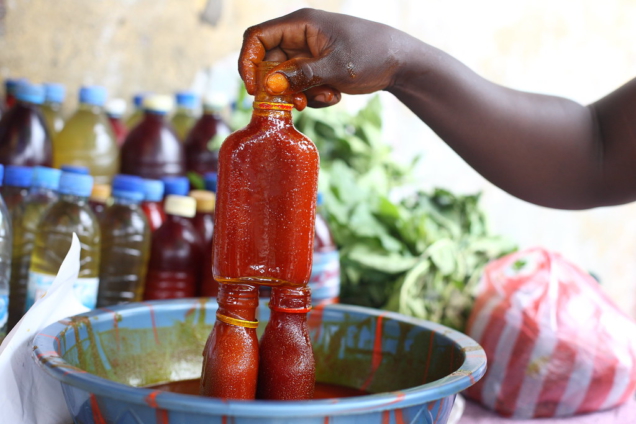Government is set to arrest and prosecute unlicensed and illegal artisanal palm oil producers and processors in the Country by next year.
The move is to drive away bad operators from producing unclean and unhealthy palm oil for consumption, which is causing a lot of illnesses, such as cancer.
The effort is expected to enhance market access for workers in the palm oil value chain in the producing districts and ensure that finished products meet both local and international market standards to generate income and taxes for development.
Paul Amaning, the National President of the Artisanal Palm Oil Millers and Outgrowers Association of Ghana, gave the hint during a product packaging training for palm oil producers at Twifo Hemang.
He noted, that a substantial part of Ghana's palm oil imports could be sourced locally from artisanal palm oil producers if they met the quality requirements of both industrial users and palm oil exporters.
Mr Amaning said the government was ready to support the millers with portable machines for palm oil processing at a convenient process within a shorter period of time.
He urged the artisanal mill owners to adapt to change and also work together as a team in advancing and digitalising the Palm oil business.
Mr Amaning, further charged the participants to register their businesses to meet the requisite standards to enhance trading and also provide jobs to reduce unemployment and increase the living standards in the Country.
John Odai Tettey, the Regional Manager of the Food and Drugs Authority (FDA) schooled participants on the requirements of business registration for them to be able to operate without interference.
He added that food hygiene and safety should be the core element of all food preparation processes, including palm oil, hence the need for processors to obtain and regularly update their knowledge in food safety and good manufacturing practices.
Mr Tettey advised consumers to stop demanding palm oil with a redder hue, explaining that such market preferences made some unscrupulous palm oil producers add substances to the product to change its natural colour, which could compromise food safety.
He urged the participants to be committed to ensuring the safety of their products to safeguard public health.
The Regional Manager advised the mill owners to follow the right procedures and measures to produce the best and quality product for the market.
Latest Stories
-
Audit Service fires back at UTAG-UG over smear campaign claims
2 hours -
Opoku Agyemang’s private jet use: Be a man of principle and resign – Ntim Fordjour to Ablakwa
5 hours -
Cameron Duodu at 88: A life penned with purpose
6 hours -
NPP’s Adenta Kumi released from NIB custody
7 hours -
Surviving and Growing in Turbulent Times: The Strategic Role of Marketing
7 hours -
McTominay stunner helps Napoli win Serie A title
7 hours -
360 Africa and Ebenezer SHS unite in Dansoman to promote ‘Renewable Energy for All’
7 hours -
Old age inspired me to establish a hotel – KSM
8 hours -
Newsfile to discuss suspended CJ’s legal battle and Accra flood crisis this Saturday
9 hours -
Gifty Anti inspires young women to rise above challenges at TAF College’s 2025 Freelancers launch
9 hours -
Police restore calm in Adoagyiri after violent clashes between youth groups
9 hours -
Obstructionist behaviour must not be tolerated – Prof Kwesi Aning warns
9 hours -
Wontumi alleges intimidation and threats amid raid at his residence
9 hours -
GREDA urges pricing discipline as cedi strengthens against dollar
9 hours -
Ghana scales up fight against obstetric fistula with free surgeries in five hospitals
9 hours

